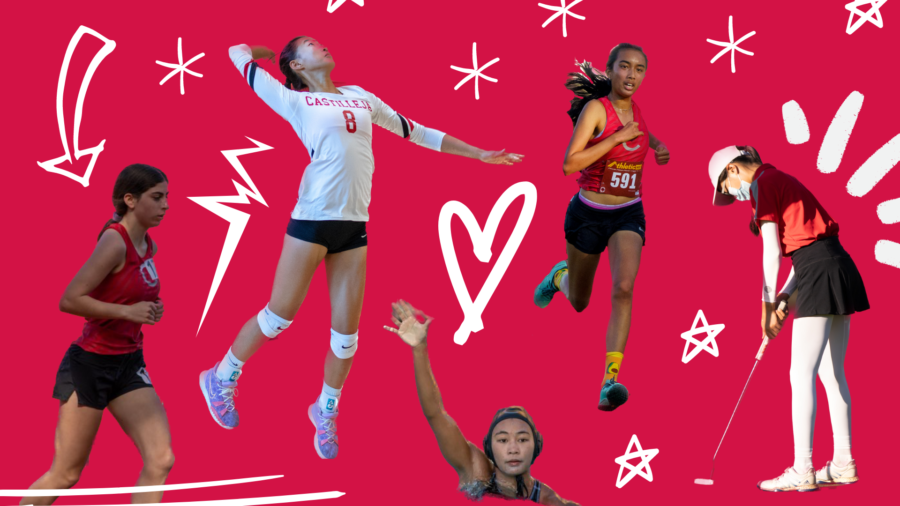Gator-stitions: The tips, tricks, and meatballs to athletic greatness
Castilleja athletes reveal the secrets that have given them success.
Castilleja is widely known for its renowned academic excellence, and while our athletics may not be as universally recognized, the quality of performance is no less impressive. Anyone who has seen the number of banners in the Upper Gym knows that Castilleja athletes are not to be reckoned with.
The school’s phenomenal record of athletic success leads me to believe that something more than hard work, determination, and luck is at play. No, something else gives our athletes that extra oomph. Something like gator-stitions. To uncover the secret, I interviewed a range of athletes from various sports to reveal the superstitions that have helped them achieve athletic greatness.
In a unique and special tradition, friends Annika Burks ’23 and Sydney Lowell ’24 must high-five each other before all of their water polo games. Other athletes prefer more independent rituals; runner Flo Correa Agazzi ’25 shared, “If I don’t eat spaghetti and meatballs the morning of a race, then I will not perform.” These performance enhancing meatballs, it turns out, are from IKEA (yes, the furniture store).
Another athlete, I discovered, obtains her success by channeling the energy of the one and only Lightning McQueen. Before track and cross country races, Naya Sangoram ‘25 closes her eyes and repeats to herself, “Speed. I am speed,” just as the legendary red car does. I would expect that Sangoram was über speedy on the day of the seniors’ Cars-themed rivalry.
While not too many other athletes use Pixar characters as motivation, a majority of interviewed athletes have a routine involving incredibly specific numbers. Basketball player Layla Gallon ’26, for instance, dribbles the ball exactly twice before free throw shots. Doing as little as one extra dribble has proven to be poor luck for her.
Similarly, for volleyball, Priscilla Chan ’25 must bounce the ball three times, spin it twice, and finally give it a nice slap before she can serve. Slaps deemed “unworthy” always have to be redone or else the risk of failure is very high indeed.
These lucky routines have been executed countless times and have become second nature to the athletes. Other athletes’ superstitions, however, require more deliberation. Golfer Norah Yang ’25 meticulously plans out her bathroom trips based on how well she is playing. She advised other golfers to use the bathroom if they’re playing poorly because “once you finish peeing, you pee out all of your bad stuff and then you do good.” However, Yang warns that if one is playing well, “Don’t go [to the bathroom] because you will pee out all of your good stuff and then you’re going to do bad!” Furthermore, Yang has a key to reversing low performance: she takes off her gloves while her opponents are swinging to “steal their good energy.” While these superstitions require methodical timing, they are undeniably effective, as Yang was awarded the league’s MVP last year.
Like Yang, aquatic athlete Serafina Cortez ’23, has many superstitions that are constantly evolving based on her performance (although she can always rely on her lucky shampoo). She reflected, “I get superstitious when I have a good game, and then I make a mental note of all the things I did that day.”
Volleyball star Claire Sun ’25 expressed a similar sentiment, explaining that she refuses to wear shirts that have a negative connotation to her. Sun explained that if she does poorly in a tournament, she has to wait a sufficient amount of time before re-wearing the shirt. After asking how long this wait time is, Sun replied, “You just feel it.”
Sun’s intuition about the state of her shirts’ good fortune seems to be related to the larger purpose of superstitions. Lila Cole ’25, a self-proclaimed non-superstitionist, reflected, “I think superstitions are less about ‘determining fate.’ I think if it helps someone feel more comfortable, then it is likely that it will help them perform better.”
Many of the superstitious athletes who were interviewed confirmed Cole’s comment, believing that their practices helped frame their mindset in preparation for competition. Cole did acknowledge, though, “Sometimes, people get a little too into it. I will not lie. Some of them are a bit far-fetched.” After asking for an example of such a superstition, Cole pointed to Yang.
In the end, channeling Lightning McQueen or consuming IKEA meatballs gives many athletes the comfort and confidence they need prior to competition. These practices are unique to each athlete, but they all are done in effort to find the athlete’s best self.
For those athletes like Cole, however, who perhaps prefer a more reliable superstition, wise sixth grader Ella Trout ’29 has the answer. When asked what her superstition was, she innocently replied, “Practice.”

Caitlyn Lee '25 is an Editor-in-Chief for Counterpoint. This year, Caitlyn is excited to uncover all of the different stories on campus, from quirky to...


